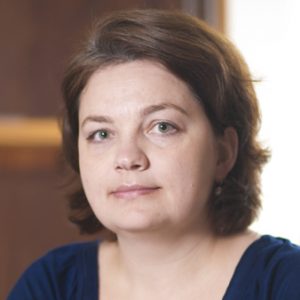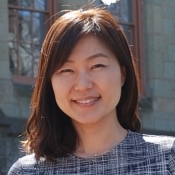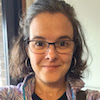Check-in, pick up symposium materials, and enjoy some coffee.
Robertson Hall, 8th Floor
Welcome
Christina Frei, Executive Director of Language Instruction at the School of Arts & Sciences, University of Pennsylvania
Robertson Hall, 8th Floor
 Christina Frei (Ph.D. University of California at Davis, 2002) is inaugural Executive Director of Language Instruction for the School of Arts & Sciences at the University of Pennsylvania. She chairs the Penn Language Center, home of many less commonly taught languages and trains the graduate teaching fellows in the Department of Germanic Languages and Literatures and across diverse departments. Her research interests include curricular design, collaborative teaching and learning and blended learning. She is co-authoring a textbook for beginning/intermediate German language and culture and regularly leads workshops in curricular design and teaching methodology nationally. She recently co-authored “Implication of the AP World Language Curriculum for University Language Programs,” AAUSC Vol. 17, 2016.
Christina Frei (Ph.D. University of California at Davis, 2002) is inaugural Executive Director of Language Instruction for the School of Arts & Sciences at the University of Pennsylvania. She chairs the Penn Language Center, home of many less commonly taught languages and trains the graduate teaching fellows in the Department of Germanic Languages and Literatures and across diverse departments. Her research interests include curricular design, collaborative teaching and learning and blended learning. She is co-authoring a textbook for beginning/intermediate German language and culture and regularly leads workshops in curricular design and teaching methodology nationally. She recently co-authored “Implication of the AP World Language Curriculum for University Language Programs,” AAUSC Vol. 17, 2016.
Affordances of Openness
Carl S. Blyth, University of Texas at Austin
Robertson Hall, 8th Floor
In the past 15 years, Open Education has become a global movement affecting all levels of education. A central feature of the movement has been the creation and sharing of open educational resources (OER), defined as resources for teaching and learning “that are openly available for use by educators and students, without an accompanying need to pay royalties or license fees” (Butcher, 2011, p. 5). OER are often shared via a Creative Commons license that allows users to revise, remix, reuse, and redistribute the material without dealing with restrictive copyright. Unfortunately, many FL educators remain unclear about OER basics such as how to find high quality OER and how to read open licenses. In this talk, I will answer language educators’ most frequently asked OER questions and summarize recent studies on the educational impact of OER. Carl S. Blyth (PhD, Cornell University) is Associate Professor of French Linguistics and Director of the Center of Open Educational Resources and Language Learning (COERLL) at the University of Texas at Austin (USA). His research interests include computer-mediated discourse, cross-cultural and intercultural pragmatics, pedagogical grammar and open educational approaches to language learning. He has published on metalinguistic awareness, the affordances of social reading for L2 literacy development, native and non-native role models for language learning, L2 narrative discourse, and interactive frames in L2 discourse. He has authored or co-authored several books and book chapters as well as journal articles in venues such as the Modern Language Journal, CALICO Journal, and Journal of Educational Computing Research. Most recently, he has published a co-edited book with Dale Koike called Dialogue in Multilingual and Multimodal Communities (2015, John Benjamins). He currently serves on the editorial board of Intercultural Pragmatics and Issues in Language Program Direction.
Carl S. Blyth (PhD, Cornell University) is Associate Professor of French Linguistics and Director of the Center of Open Educational Resources and Language Learning (COERLL) at the University of Texas at Austin (USA). His research interests include computer-mediated discourse, cross-cultural and intercultural pragmatics, pedagogical grammar and open educational approaches to language learning. He has published on metalinguistic awareness, the affordances of social reading for L2 literacy development, native and non-native role models for language learning, L2 narrative discourse, and interactive frames in L2 discourse. He has authored or co-authored several books and book chapters as well as journal articles in venues such as the Modern Language Journal, CALICO Journal, and Journal of Educational Computing Research. Most recently, he has published a co-edited book with Dale Koike called Dialogue in Multilingual and Multimodal Communities (2015, John Benjamins). He currently serves on the editorial board of Intercultural Pragmatics and Issues in Language Program Direction.
Q & A with Carl S. Blyth
Robertson Hall, 8th Floor
Creating Language and Culture Teaching Materials for Russian
Maria Alley, Russian Language Program Coordinator, University of Pennsylvania
JMHH Room F55
 Maria Alley is a Lecturer in Foreign Languages and the Russian Program coordinator. She teaches Russian language and culture, and graduate reading and teaching methodology courses and supervises the work of Russian language instructors and teaching assistants. Maria also serves on the faculty of the Middlebury College Kathryn Wasserman Davis School of Russian. She co-authored a Russian language textbook Animation for Russian Conversation (Focus Publishing, 2008). Her interests include second language acquisition and language pedagogy, proficiency testing, and materials development.
Maria Alley is a Lecturer in Foreign Languages and the Russian Program coordinator. She teaches Russian language and culture, and graduate reading and teaching methodology courses and supervises the work of Russian language instructors and teaching assistants. Maria also serves on the faculty of the Middlebury College Kathryn Wasserman Davis School of Russian. She co-authored a Russian language textbook Animation for Russian Conversation (Focus Publishing, 2008). Her interests include second language acquisition and language pedagogy, proficiency testing, and materials development.
Online Tamil Teaching and Learning Materials
Vasu Renganathan, Lecturer, Penn Language Center, University of Pennsylvania
JMHH Room F60
 Vasu Renganathan is from Tamil Nadu, India and has been teaching Tamil language and literature in the U.S. since 1989. He previously taught at the University of Washington, University of Michigan, and University of Wisconsin-Madison before coming to Penn. Renganathan headed a Department of Education project to develop online Tamil learning materials which is used extensively by second language learners of Tamil throughout the world. A modified version of this website is also published in a book form entitled Tamil Language in Context: A comprehensive method for learning Tamil. He earned his Ph.D. at the department of South Asia Studies on the language of one of the medieval Tamil religious works called Tirumantiram, and his recent book is Computational Approaches to Tamil Linguisitics published in Chennai, India. This book is an inter-disciplinary work comprising the fields of Tamil Linguistics and Computer Science. He has published many articles on Tamil literature and language teaching and learning. His works and other accomplishments can be viewed at his homepage: http://www.sas.upenn.edu/~vasur.
Vasu Renganathan is from Tamil Nadu, India and has been teaching Tamil language and literature in the U.S. since 1989. He previously taught at the University of Washington, University of Michigan, and University of Wisconsin-Madison before coming to Penn. Renganathan headed a Department of Education project to develop online Tamil learning materials which is used extensively by second language learners of Tamil throughout the world. A modified version of this website is also published in a book form entitled Tamil Language in Context: A comprehensive method for learning Tamil. He earned his Ph.D. at the department of South Asia Studies on the language of one of the medieval Tamil religious works called Tirumantiram, and his recent book is Computational Approaches to Tamil Linguisitics published in Chennai, India. This book is an inter-disciplinary work comprising the fields of Tamil Linguistics and Computer Science. He has published many articles on Tamil literature and language teaching and learning. His works and other accomplishments can be viewed at his homepage: http://www.sas.upenn.edu/~vasur.
Reality Czech: Open Educational Resources for Teaching Czech
Christian Hilchey, Lecturer, Department of Slavic and Eurasian Studies, University of Texas at Austin
Robertson Hall, 8th Floor
This presentation will focus on many of the features of the Reality Czech curriculum, a completely open curriculum currently under development at the University of Texas at Austin. The goal of the project is to develop a complete textbook replacement for First-year Czech language courses. In addition to significant original content creation, the curriculum utilizes many types of open content freely available over the internet.
This presentation will focus on both the rationale for creating an open textbook as well as some of the ways using open content has shaped the trajectory of the Reality Czech curriculum. Particularly, I will relate how my own shift in values toward favoring open content led me to reevaluate what is good and useable content. I will argue that open resources can not only meet the needs typically met by closed content, but often represent a better option for our students. This presentation will be useful to those who are interested in working on OERs or are considering a similar project.
 Christian Hilchey is a lecturer in the Department of Slavic and Eurasian Studies and teaches primarily courses related to Czech language and culture. He received his PhD in Slavic Languages and Linguistics from the University of Chicago in Spring 2014 and began his position at the University of Texas in the Fall of 2014. His dissertation focused on distributivity in a select class of Czech verbs.
Christian Hilchey is a lecturer in the Department of Slavic and Eurasian Studies and teaches primarily courses related to Czech language and culture. He received his PhD in Slavic Languages and Linguistics from the University of Chicago in Spring 2014 and began his position at the University of Texas in the Fall of 2014. His dissertation focused on distributivity in a select class of Czech verbs.
He has taught Czech language classes at UT From the beginning to the Advanced level (1st-5th year Czech). He has also taught a course on Texas Czechs. His interests include language teaching pedagogy and is currently writing an online open textbook Reality Czech along with the Center for Open Educational Resources and Language Learning (COERLL).
Adapting Materials for Online Instruction (Hindi/Urdu)
Joshua Pien, Lecturer in Foreign Languages, South Asia Studies, University of Pennsylvania
JMHH F60
 Joshua Pien began teaching Hindi-Urdu in 2006 and has been at the University of Pennsylvania since 2012. He is co-author of the parallel textbooks Beginning Urdu (Georgetown University Press, 2012) and Beginning Hindi (GUP, 2014). In addition to his academic-year teaching, he has also directed Penn’s intensive Hindi-Urdu summer program through STARTALK since 2014. This course was brought completely online in 2016 and 2017 and was the first university-level online course in Hindi or Urdu in the country. Pien will discuss the experience of developing and adapting materials for online instruction and weave in comparisons with developing materials for publication in traditional textbook form.
Joshua Pien began teaching Hindi-Urdu in 2006 and has been at the University of Pennsylvania since 2012. He is co-author of the parallel textbooks Beginning Urdu (Georgetown University Press, 2012) and Beginning Hindi (GUP, 2014). In addition to his academic-year teaching, he has also directed Penn’s intensive Hindi-Urdu summer program through STARTALK since 2014. This course was brought completely online in 2016 and 2017 and was the first university-level online course in Hindi or Urdu in the country. Pien will discuss the experience of developing and adapting materials for online instruction and weave in comparisons with developing materials for publication in traditional textbook form.
Teaching Materials for Intercultural Competence (Korean)
Ji-Young Jung, Lecturer in Foreign Language, Department of East Asian Languages and Civilizations, University of Pennsylvania
JMHH Room F55
 Ji-Young Jung teaches all levels of Korean as a Lecturer in Foreign Language in the Department of East Asian Languages and Civilizations. She completed her doctorate in Applied Linguistics at Teachers College, Columbia University, concentrating on foreign language pedagogy. Her research focuses mainly on understanding language acquisition and use as social interaction in the context of intercultural encounters. Ji-Young’s recently-completed projects include the development of Standards-based curriculum for college Korean with AATK and the development of online materials for flipped classroom and blended learning at Penn. She has published her work on Korean for Specific Purposes and Heritage Korean learning in peer-reviewed journals on Korean language education.
Ji-Young Jung teaches all levels of Korean as a Lecturer in Foreign Language in the Department of East Asian Languages and Civilizations. She completed her doctorate in Applied Linguistics at Teachers College, Columbia University, concentrating on foreign language pedagogy. Her research focuses mainly on understanding language acquisition and use as social interaction in the context of intercultural encounters. Ji-Young’s recently-completed projects include the development of Standards-based curriculum for college Korean with AATK and the development of online materials for flipped classroom and blended learning at Penn. She has published her work on Korean for Specific Purposes and Heritage Korean learning in peer-reviewed journals on Korean language education.
Jung’s current project is the development of materials for heritage learners of Korean, which is generously supported by a PLC’s Innovative Teaching grant. The materials are firmly grounded in ACTFL’s Standards and Proficiency guidelines and incorporate feedback from Korean language pedagogues obtained through a nationwide survey with 37 leading institutions. These materials include a wide range of registers and genres, cross-cultural comparisons, and discussions of sociolinguistic issues to enhance intercultural competence. All tasks are backwards designed, adopting techniques of IPA (Integrated Performance Assessment) and principles of collaborative learning. She is currently co-authoring a two-volume textbook for accelerated college Korean.
Differentiating Authentic Materials, Enhancing the Language and Culture Learning Experience
Lillyrose Veneziano Broccia, Italian Language Program Director, Department of Romance Languages, University of Pennsylvania
JMHH Room F55
This presentation will highlight examples of content and outcomes from Language and Culture courses that focus on fundamental aspects of SLD, such as meaningful vocabulary building and process reading, listening, viewing, and writing. Project-based, goal-oriented teaching, and task-based activities, divert from the traditional model of “coverage,” offering students authentic cultural content that serves as a means through which to reach, and even surpass, communicative and pedagogically robust objectives. Differentiating the learning experience also affords students the freedom and responsibility to engage in all aspects of their linguistic and cultural journey. Shared materials will highlight the incorporation of the 5Cs, focus on the 3 modes of communication, and shine a spotlight on how creativity motivates students to become, and remain, engaged with new Languages and Cultures, both inside and outside the classroom, via the careful use of technology, as well as extra-curricular events.
 Lillyrose Veneziano Broccia is a native of Philadelphia, Pennsylvania and was raised bilingual in a Sicilian and English speaking home. She earned her BA in Italian and French from Temple University in Philadelphia, her MA in Italian Language at Middlebury College in Vermont and Italy, and her PhD in Italian from Columbia University in the City of New York. She is Director of the Italian Language Program, Undergraduate Chair of Italian, and Faculty Advisor for the UPenn Italian Club at the University of Pennsylvania in Philadelphia – where she has been teaching all levels of Italian Language, in addition to Professional Purposes, Cinema, History and Literature courses, in both Italian and English, in face-to-face as well as online and blended classes, since 2007. She also teaches various levels of ESL, and regularly offers and takes part in Professional Development for and with fellow Language and Culture Educators.
Lillyrose Veneziano Broccia is a native of Philadelphia, Pennsylvania and was raised bilingual in a Sicilian and English speaking home. She earned her BA in Italian and French from Temple University in Philadelphia, her MA in Italian Language at Middlebury College in Vermont and Italy, and her PhD in Italian from Columbia University in the City of New York. She is Director of the Italian Language Program, Undergraduate Chair of Italian, and Faculty Advisor for the UPenn Italian Club at the University of Pennsylvania in Philadelphia – where she has been teaching all levels of Italian Language, in addition to Professional Purposes, Cinema, History and Literature courses, in both Italian and English, in face-to-face as well as online and blended classes, since 2007. She also teaches various levels of ESL, and regularly offers and takes part in Professional Development for and with fellow Language and Culture Educators.
Her research interests include Italian Renaissance Poetry, Contemporary Italian Literature, Italian Cinema, Language and Culture Teaching Pedagogy and Second Language Development.
She has published several translations, as well as an original piece of poetic prose entitled, “Hyphenated Identity: Sicily in the Body of an American Poet” in Sweet Lemons: Writing with a Sicilian Accent (Legas, 2004); co-authored an Edizioni Farinelli Film Study Program based on the movie Il divo (2011); and published an Edizioni Farinelli Music Study Program, Italia 1988-2012 (2014), based on Jovanotti’s USA release compilation album.
She regularly presents at conferences such as ACTFL, MLA, SaMLA, NeMLA, AAIS, and AISLLI. She is Vice-President of NEALLT (The Northeast Association for Language Learning Technology).
She is co-founder of The Italian Language Arts Community Service Course Collaboration, a program of Italian and Spanish lessons dedicated to helping Phiadelphia VA Medical Center Veterans achieve their goals.
Chinese Literacy, Cultural Context, and Vocabulary Acquisition in Textbook Design
Grace Wu, Senior Lecturer in Foreign Languages, East Asian Languages and Civilizations Department, University of Pennsylvania
JMHH Room F60
This workshop will discuss the challenges often faced when designing textbooks and teaching materials for Chinese Reading and Writing courses (heritage track). These students have already established some basic skills in listening, speaking, reading and writing. However, they still have issues applying these skills to communicate effectively in unfamiliar situations. Our challenge is to expand students’ knowledge base and provide various practice environments to help students make this leap. In the first part of presentation, Wu will explain how we can effectively incorporate Top down/Macro Approaches in heritage course materials. Next, she will demonstrate how her course materials have helped students to not only acquire literacy, but also acknowledge and appreciate their unique position as an individual living simultaneously among two different cultures. Lastly, she will share the publication process and her experience for creating Open Source (free) Chinese Biographies companion websites.
 Grace Wu is a Senior Lecturer in Foreign Languages in the Department of East Asian Languages and Civilizations at the University of Pennsylvania, specializing in Chinese literacy and Chinese character teaching. Currently, Grace is the Chinese Reading and Writing Course coordinator (CHIN 031, CHIN 032, CHIN 231, CHIN 232) at the Penn Chinese Language Program. Her Chinese Biographies series has been selected as the SAS best grant project of 2012. Grace has been teaching Online Beginning Business Course (CHIN 081-980; CHIN 082-981) through Adobe Connect since summer 2012 and collaborates with other online language teachers (German, Arabic, Italian and Korean) for curriculum designing and promoting online language teaching. Grace has made numerous presentations, led multiple workshops, and published several innovative and versatile Pinyin annotated readers.
Grace Wu is a Senior Lecturer in Foreign Languages in the Department of East Asian Languages and Civilizations at the University of Pennsylvania, specializing in Chinese literacy and Chinese character teaching. Currently, Grace is the Chinese Reading and Writing Course coordinator (CHIN 031, CHIN 032, CHIN 231, CHIN 232) at the Penn Chinese Language Program. Her Chinese Biographies series has been selected as the SAS best grant project of 2012. Grace has been teaching Online Beginning Business Course (CHIN 081-980; CHIN 082-981) through Adobe Connect since summer 2012 and collaborates with other online language teachers (German, Arabic, Italian and Korean) for curriculum designing and promoting online language teaching. Grace has made numerous presentations, led multiple workshops, and published several innovative and versatile Pinyin annotated readers.
